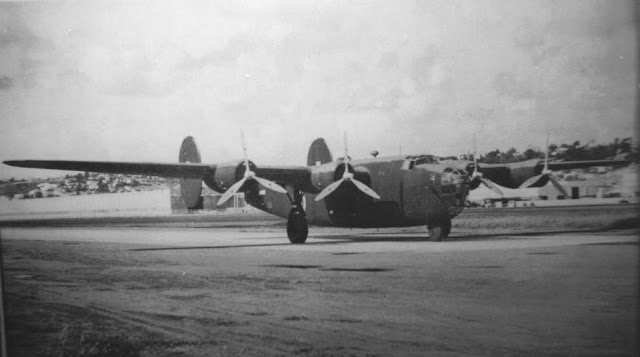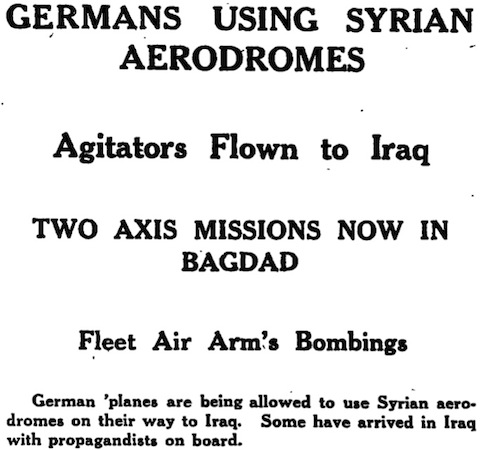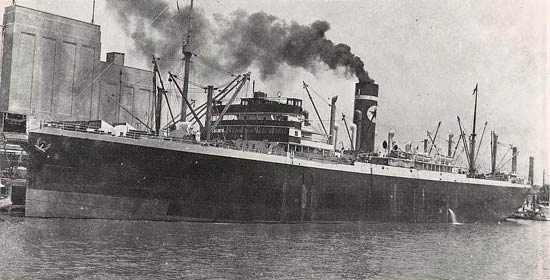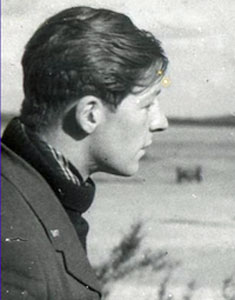Friday 16 May 1941
 |
| "Children waving at a Valentine tank of the 2nd Battalion, 1st Tank Regiment (1st Polish Corps) on the move against the 'invaders' during a mock invasion exercise in Perthshire. Polish troops played the role of the defenders, while Scottish troops (probably the 51st Highland Division) took the part of the invaders." Captain W.T. Lockeyear, © IWM (H 9786). |
The Germans respond by sending three Heinkel He 111 bombers and six Bf 110s against the main British airfield at Habbaniya. The Germans kill numerous British ground personnel and destroy a Hawker Audax fighter-bomber and shoot down a Gloster Gladiator fighter, both obsolete biplanes but still useful in the theater. Debris from the exploding Gladiator disables one of the Heinkels' engines, causing it to crash-land on the way back to Mosul.
Oberst Werner Junck, leader of the German forces (Fliegerführer Irak), flies to Baghdad from Mosul in place of the deceased Major Axel von Blomberg, recently shot in his transport while approaching Baghdad. He meets with Rashid Ali, German representative Dr. Grobba, and other top Iraqi leaders. The group decides to interdict Kingcol, the British relief column currently at Fort Rutbah, and prevent it from relieving RAF Habbaniya. Sonderkommando Junck also is to assist Iraqi ground forces in taking Habbaniya.
Several German ships anchored at Bandari Shahpur are ordered to scuttle themselves in the Shatt al-Arab. The hope is that they will block the entrance to the refinery there.
The Soviet Union recognizes the Rashid Ali government in Iraq via an exchange of diplomatic notes in Ankara, Turkey.
 |
| An early Consolidated B-24 Liberator that arrives in the UK on 16 May 1941. This plane is slotted to be used for crew training in RAF No. 120 Squadron Coastal Command. |
The Luftwaffe sends 111 aircraft to raid RAF airfields in Birmingham and the West Midlands. The Germans lose three planes. While not apparent at the moment, this is the final Luftwaffe night bomber raid on England during the May Blitz. The Luftwaffe is shifting massive forces east in preparation for Operation Barbarossa.
The Luftwaffe sends fighter-bombers (Jabo) to raid southeast England. While Jabos carry a small payload, they are more accurate than level bombers and incur fewer losses. They also engage in strafing missions and can battle defending RAF fighters on an equal basis.
RAF Bomber Command raids Cologne with 93 planes after dark, causing fires on both sides of the Rhine. The Atlantik rubber plant at Bramsfeld (in the Ruhr Valley) also is attacked, with some success. Diversionary attacks in France and Holland also are effective, and overall the RAF loses two planes.
 |
| Manchester Guardian, 16 May 1941. |
 |
| British freighter Rodney Star, sunk 16 May 1941 off Freetown by U-105. |
The 83-man crew of the Rodney Star (everyone survives) spends six days in lifeboats before being rescued by HMS Batna and Boreas and taken to Takoradi. According to some accounts, U-105's deck gun blew up during a training exercise on 6 May, while other accounts state that it blew up while firing on the Rodney Star, injuring six crew.
British 2448-ton freighter Archangel is badly damaged by the Luftwaffe. The ship, 10 miles north of Aberdeen, is attacked by three Heinkel He 111 bombers around midnight on the 16th and badly damaged. The ship later sinks while under tow to Aberdeen (some accounts say it was beached and broke up onshore). There are 41 deaths and 42 wounded, all enlisted men out of 475 men on board (figures vary). The wounded suffer from burns.
The Luftwaffe bombs and sinks 5673-ton British freighter Ethel Radcliffe at Great Yarmouth. The Ethel Radcliffe had been damaged by German S boats on 17 April.
The Luftwaffe bombs and badly damages 715-ton British freighter Joffre Rose off St. David's Head. The ship's master manages to beach the ship in Dale Bay, and, and further attacks by the Luftwaffe, the ship ultimately is refloated and repaired.
The Luftwaffe bombs and damages 811-ton British freighter Obsidian in St. George's Channel.
U-107 (Kptlt. Günter Hessler), also operating off Freetown, spots 8029-ton Dutch tanker Marisa in the distance and begins pursuit.
U-109 (Kptlt. Hans-Georg Fischer), on its first patrol out of Kiel, spots a large formation of US ships that includes battleships and several destroyers. Fischer, following orders, avoids contact.
Issues to the port-side crane of battleship Bismarck are resolved to Captain Lindemann's satisfaction. Admiral Lütjens reports the ship ready for action. Admiral Doenitz authorizes Operation Rheinübung, the planned sortie to the North Atlantic by Bismarck and cruiser Prinz Eugen, to begin on the evening of 19 May.
Royal Navy minelayers HMS Teviotbank and Plover lay minefield BS-56 in the English Channel.
Convoys HX 127 and BHX 127 depart from Halifax and Bermuda, respectively.
Royal Navy corvettes Jasmine (Lt.Cdr. (retired) Cecil Dick Bluett Coventry) and Lavender (Lt.Cdr. Jackson Whayman, RNR) are commissioned, frigate Exe is laid down at Paisley.
Canadian corvette HMCS Levis (Lt. Charles W. Gilding) is commissioned, and corvette Shawinigan is launched at Lauzon, Quebec.
U-385 and U-386 are laid down.
 |
| RAF ace Noël le Chevalier Agazarian, KIA 16 May 1941. |
Lt. Colonel Hans Cramer, in command of the panzers, launches an aggressive attack against the British which succeeds. At the front, the British 22nd Guards Infantry Brigade withdraws from Fort Capuzzo and Sollum to Halfaya Pass, while the British 7th Armored Brigade withdraws from Sidi Aziz. The British Army forms a new line running from Sidi Omar to Sidi Suleiman to Sollum. This gives up all of the British gains from Operation Brevity aside from Halfaya Pass itself. The British are forced to retire because they have sustained heavy tank losses following the rapid Wehrmacht response to the attack.
Overhead, the RAF and Luftwaffe battle it out during Operation Brevity. RAF ace (seven victories) Noël le Chevalier Agazarian of 274 Squadron perishes when Fw. Franz Elles in a Messerschmitt Bf 109 of 2./JG 27 shoots his Hawker Hurricane near Gambut.
Separately from the German attacks, Italian troops launch an unexpected attack on Tobruk. Sappers clear barbed wire and clear mines. The Italian infantry then moves forward and takes some bunkers.
Clearly worried about the staunch Axis defense on the Libyan frontier, Winston Churchill cables Middle East Commander General Archibald Wavell and asks if it would be okay to repeat the recent Tiger Convoy, which sent hundreds of tanks directly through the Mediterranean to Alexandria. Churchill notes, "in view of the heavy loss of I tanks on 15th May, victory may depend upon the last hundred."
In a message to South African leader Jan Smuts, Churchill notes that "President Roosevelt is pushing United States supplies towards Suez to the utmost." Churchill also states "I have good hopes that we shall win the campaign in the Eastern Mediterranean this summer."
The British use Australian destroyer HMAS Vampire to reinforce Tobruk during the night.
Light cruisers HMS Fiji and Gloucester land troops at Heraklion, Crete and then join the Royal Navy forces operating in large numbers near Crete. The Luftwaffe continues its attacks on the British base at Suda Bay, damaging 5993-ton freighter Logician and 6397-ton Greek freighter Nicolaou Ourania (beached and repaired by the Germans) and sinking 1070-ton Greek freighter Kythera. The RAF loses two Hurricanes of No. 33 Squadron based at Maleme.
Royal Navy submarine HMS Unbeaten fires at Axis transports off Tripoli but misses.
Winston Churchill sends Malta Governor Dobbie a message saying that he is sending Donald Parker Stevenson, DSO, to be his new air commander because "He embodies the offensive spirit." The Luftwaffe raids continue against the island, and today they damage destroyer HMS Encounter and sink freighter Araybank.
A minesweeper, HMS Gloxinia, is damaged by a mine near Malta, and minesweeper Widnes is damaged by a bombing near-miss in the eastern Mediterranean, adding to the numerous minesweepers in the Mediterranean that have been put out of action. The island's government releases figures today providing data on the effects of the air attacks to date:
- 2087 houses destroyed
- 11,679 homeless
 |
| USS Monssen (DD-436) at Puget Sound Navy Yard, Bremerton, Washington, 16 May 1941 (Official U.S. Navy Photograph, from the collections of the Naval Historical Center.). |
Churchill writes that Hess has made "proposals for settlement." Churchill continues:
Hess said that the Fuehrer had never entertained any designs against the British Empire, which would be left intact save for the return of former German colonies, in exchange for a free hand for him in Europe. But condition was attached that Hitler would not negotiate with present Government in England.Churchill notes that Hess has denied that Germany is making plans to attack Russia, but that the Reich does have plans in Asia. These include the removal of British forces from Iraq. Hess also makes "rather disparaging remarks" about the United States and its "aircraft types and production."
Churchill concludes that if Hess "is honest and if he is sane this is an encouraging sign of ineptitude of German Intelligence service" for thinking that there is a strong peace faction in Great Britain which he hoped to stimulate. Regarding that last point, Churchill later notes that "Hess seems in good health and not excited and no ordinary signs of insanity can be detected."
US/Chinese Relations: President Roosevelt states that the US has a vital interest in the defense of China.
 |
| Wake Island, May 1941(U.S. National Archives Photo 80-G-451195 from the U.S. National Park Service website A MAGNIFICENT FIGHT: Marines in the Battle for Wake Island). |
Winston Churchill, in his message today to Jan Smuts, notes that "It looks as if Hitler is massing against Russia." He continues regarding Operation Barbarossa, still a full month away:
A ceaseless movement of troops, armoured forces and aircraft northwards from the Balkans and eastward from France and Germany is in progress. I should myself suppose his [Hitler's] best chance was to attack the Ukraine and Caucasus thus making sure of corn and oil.Whatever his sources, most likely Ultra decrypts, Churchill is deadly accurate in this summary to Smuts. His strategic analysis also jibes closely with Hitler's own views, which are opposed by many generals and the OKW, who favor focusing on Moscow.
Churchill authorizes the movement of Rudolf Hess, still in a Glasgow military hospital, to the Tower of London "by tonight pending his place of confinement being prepared at Aldershot." Once again, Churchill emphasizes that "he must be kept in the strictest seclusion."
US Military: First delivers are made to the US Army Air Corps of the P-43 Lancer fighter. Separately, General Walter Krueger takes command of the US Third Army.
British Government: British Prime Minister Winston Churchill sends a memo to Sir Kingsley Wood, Chancellor of the Exchequer, arguing that the survivors of soldiers killed while on leave should receive the same compensation as those actually killed in action. Heretofore, survivors have been given much smaller amounts. He writes that soldiers:
have a right to be considered when on leave as enjoying the same privileges in regard to pensions for their widows etc. as when they are with their Units.Wood has resisted making the change because of cost, so Churchill asks for the figures.
German Government: The Gestapo arrests Karl Haushofer, a friend (former employer) of Rudolf Hess. Haushofer is one of many German philosophers who have argued that Germany should expand. As a former major general from World War I, he enjoys some status within the Reich and respect by Hitler. Haushofer's wife is Jewish, or rather a "half-Jew" according to Reich racial laws, and to date, Hess has protected her - but that protection now is gone. While paternity of the word "Lebensraum" and its significance within the Third Reich generally is assigned to Hitler in "Mein Kampf," some attribute the concept as used by the Reich as belonging to Haushofer.
Martinique: Churchill inquires to General Ismay about the status of Martinique and says that "I have it in mind that the United States might take over Martinique to safeguard it from being used as a base for U-boats in view of Vichy collaboration." Great Britain, of course, has no control over either Vichy France or the United States, so Churchill cannot compel anything to happen regarding the government of the island, but, of course, Churchill has an opinion on everything and a lot of influence with President Roosevelt.
Iceland: The Althing (Icelandic Parliament) adopts four constitutional amendments intended to complete de facto independence from Denmark, which is effectively occupied by the Reich even if its government has been allowed to remain in place and theoretically retains freedom of decision. However, the Icelandic-Danish Act of Union remains in place for the time being (until February 1944). The Danish ambassador in Washington, D.C., who is not encumbered by coercion by the Reich, has been making decisions and representations on behalf of Iceland favorable to the Allies whose legality is questionable, and this action by the Althing does nothing to resolve that. Iceland itself is occupied by British troops, which the Icelandic government has protested against without result.
It is fair to say that the status of Iceland remains a giant unfinished puzzle, though its territory without question is greatly aiding the Allies. In any event, Iceland is going its own way regardless of legalities.
Malaya: General Percival, who has recently arrived by plane from Great Britain, assumes his post as General Officer Commanding, Malaya.
China: Japanese bombers raid Nationalist capital Chungking.
 |
| The 1st Armored Division M2A4 light tanks and medium tank parade for a Congressional Committee visiting Ft. Knox, KY, 16 May 1941. |
May 1941
May 1, 1941: British Hold Tobruk
May 2, 1941: Anglo-Iraq War
May 3, 1941: Liverpool Hammered
May 4, 1941: Hitler Victory Speech
May 5, 1941: Patriots Day
May 6, 1941: Stalin In Command
May 7, 1941: May Blitz
May 8, 1941: Pinguin Sunk
May 9, 1941: U-110 Captured
May 10, 1941: Hess Flies Into History
May 11, 1941: The Hess Peace Plan
May 12, 1941: Tiger Arrives Safely
May 13, 1941: Keitel's Illegal Order
May 14, 1941: Holocaust in Paris
May 15, 1941: Operation Brevity
May 16, 1941: Blitz Ends
May 17, 1941: Habbaniya Relieved
May 18, 1941: Croatia Partitioned
May 19, 1941: Bismarck at Sea
May 20, 1941: Invasion of Crete
May 21, 1941: Robin Moore Sinking
May 22, 1941: Royal Navy Destruction Off Crete
May 23, 1941: Crete Must Be Won
May 24, 1941: Bismarck Sinks Hood
May 25, 1941: Lütjens' Brilliant Maneuver
May 26, 1941: Bismarck Stopped
May 27, 1941: Bismarck Sunk
May 28, 1941: Crete Lost
May 29, 1941: Royal Navy Mauled Off Crete
May 30, 1941: Sorge Warns, Stalin Ignores
May 31, 1941: British Take Baghdad
2020

No comments:
Post a Comment